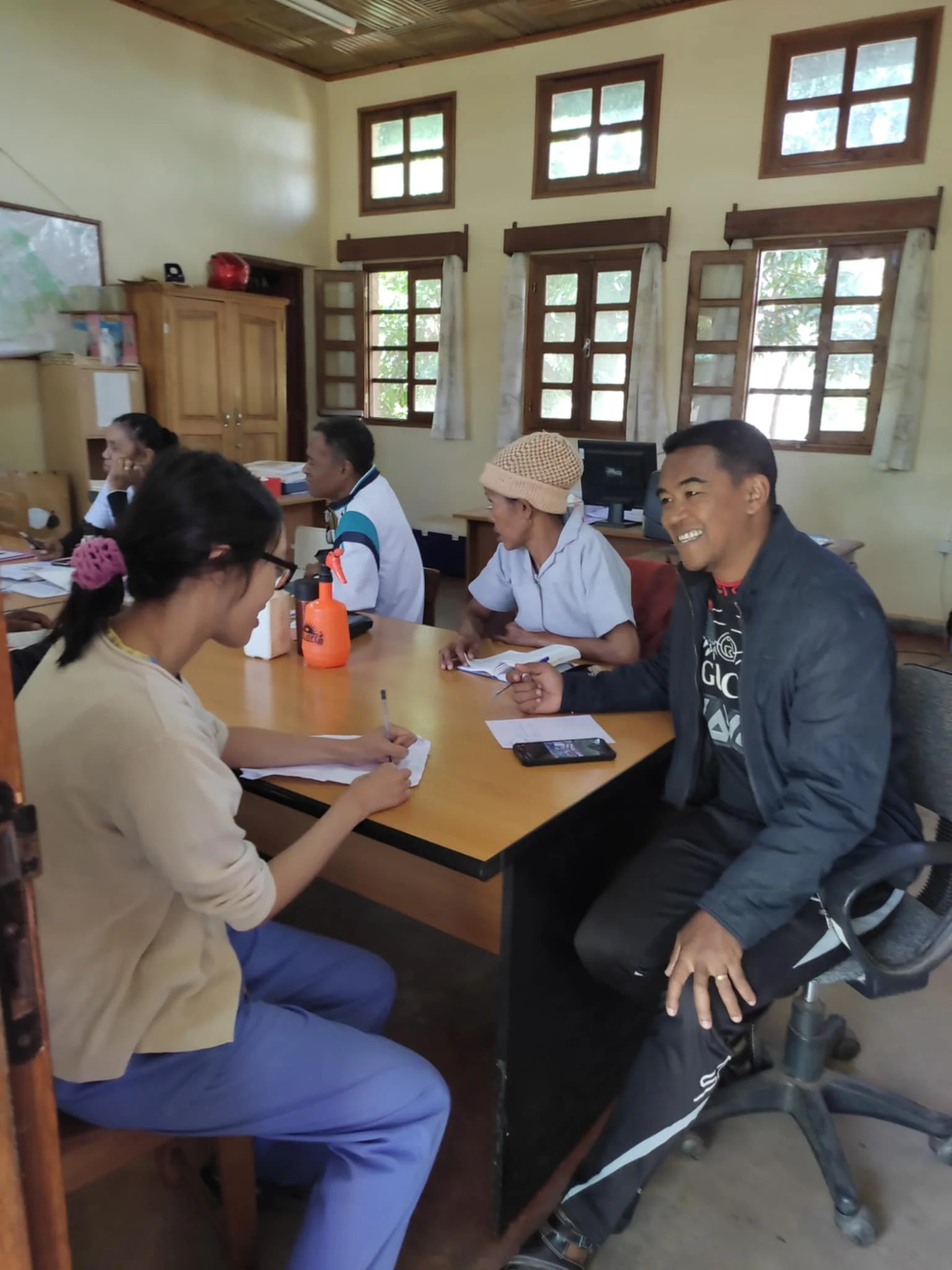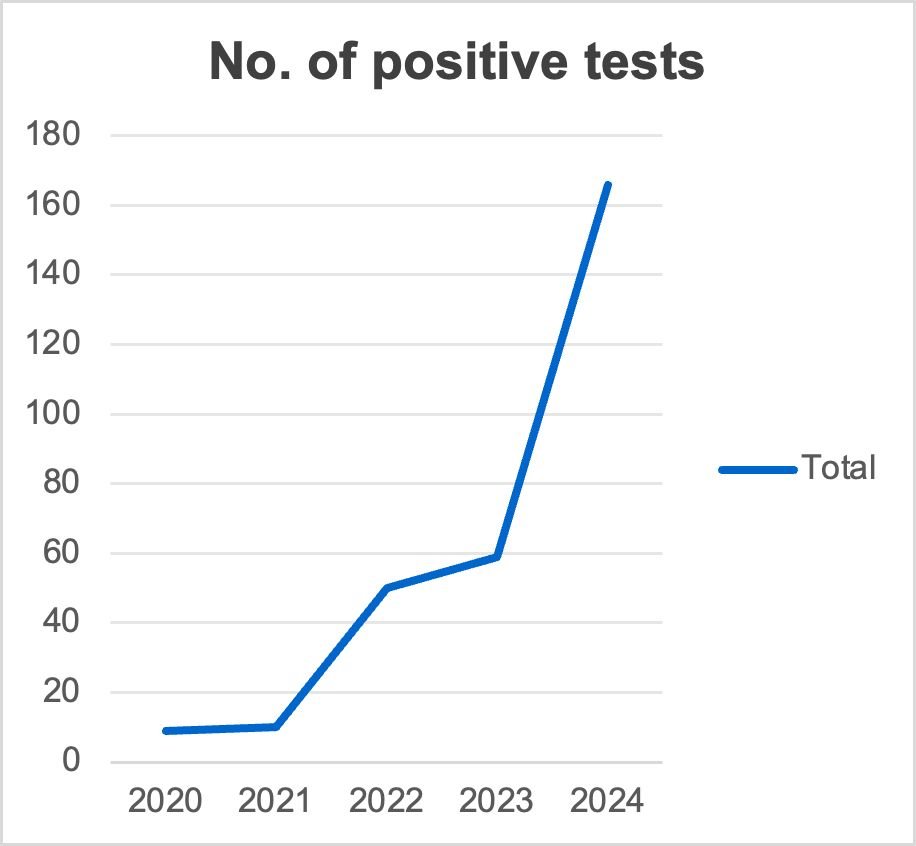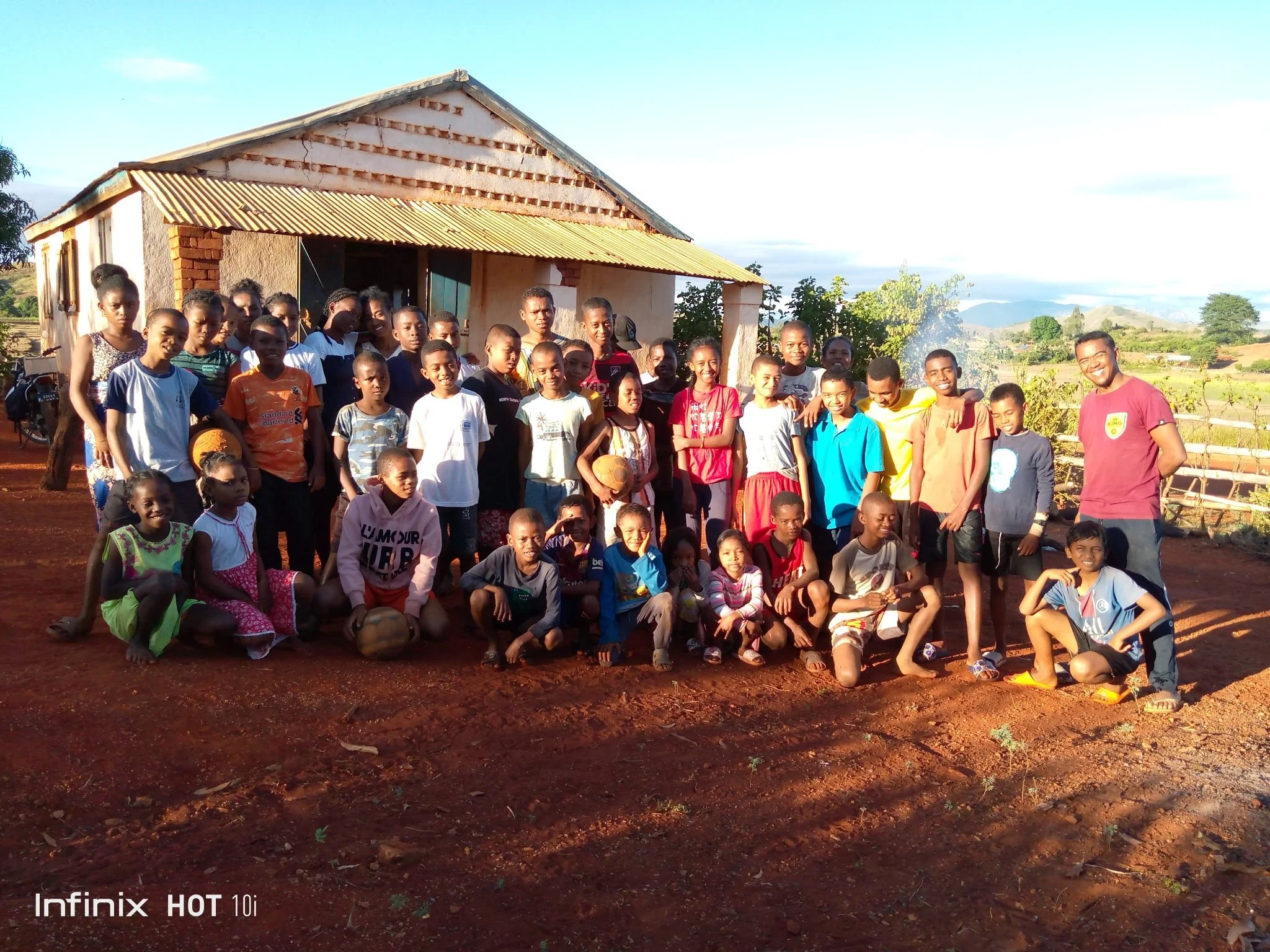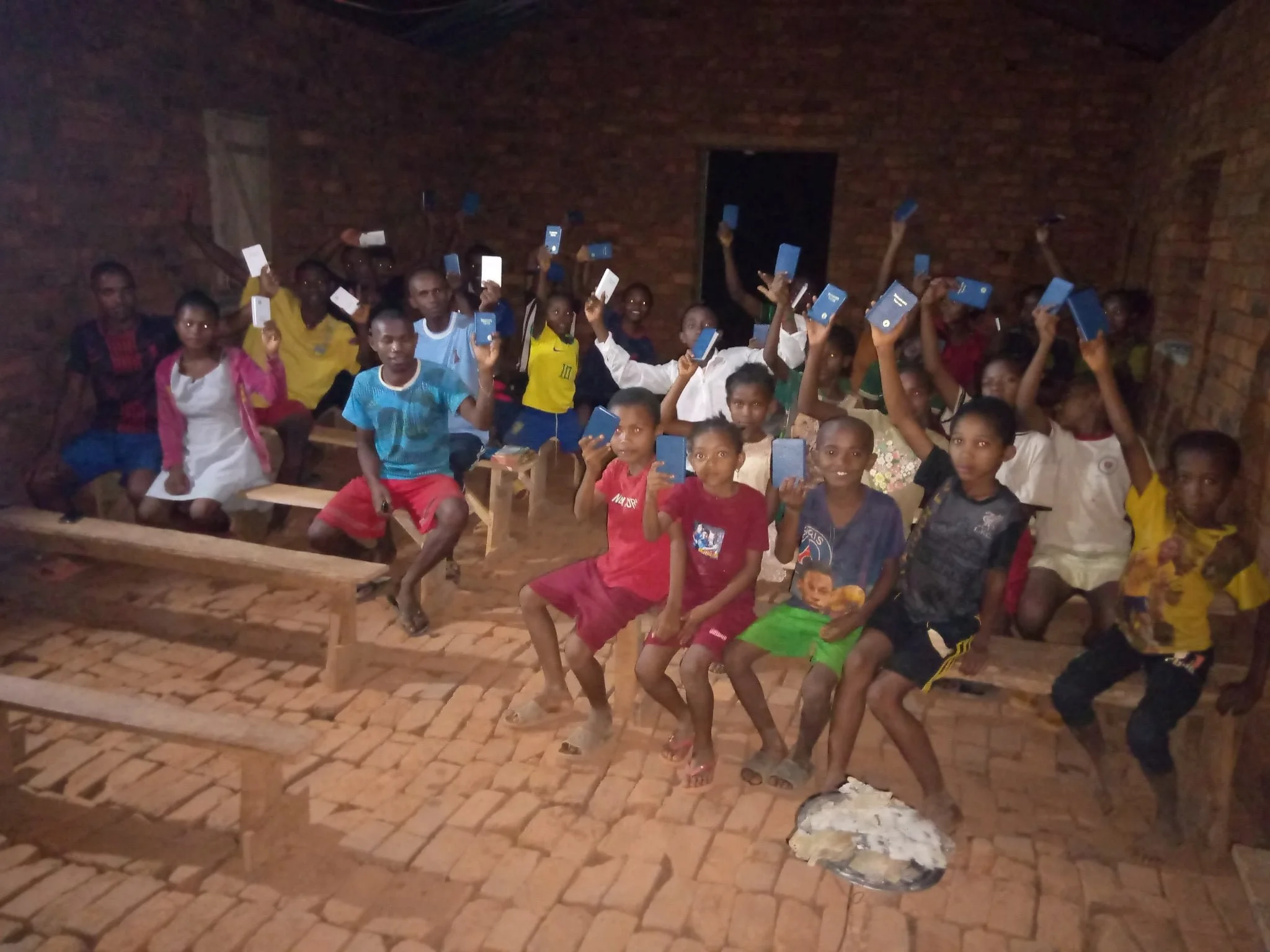by Dr Jackie Chui, short-term missionary doctor
and Andry Mahefanirina, Community Health team leader
Among the beautiful hills of Mandritsara and surrounding region lies a brewing epidemic of HIV.
HIV prevalence is increasing rapidly throughout Madagascar, and with many people not yet aware that they are infected, we are facing a huge challenge in tackling this epidemic. The obstacles are numerous - poverty and inequalities, lack of health literacy, stigma and fear - to name a few. There has been a massive increase in AIDs-related deaths in Madagascar since 2010 and there is a large treatment gap for those living with HIV.
Most recent data at HVMM show that the number of positive HIV tests have soared in the past few years, from 9 people who were newly diagnosed with HIV in 2020 to 166 in 2024, and the latest data shows that over 1 in 10 of tests requested in April 2025 were positive. In the following chart you can see how the numbers have sky-rocketed.
HIV tests at the Good News Hospital by year
In the few months that I have worked in the medical department at HVMM, I have seen patients of all ages and all clinical stages, presenting with a variety of symptoms or opportunistic infections. For example, a lady in her early twenties who presented with recurrent sexually transmitted infections (STIs), or a young man with unexplained weight loss, or a 4 year old little girl with severe acute malnutrition, or patients presenting with tuberculosis of the lung, or severe thrush in the oesophagus. Many patients come with new diagnoses; others come who have not kept up with their treatment. In each case it has been great to see the passion and dedication of the hospital team as they provide patient-centred care and seek lasting change in tackling HIV.
Dr Jackie talking to Andry
The support of donors has been pivotal for this, and we are extremely grateful that their generosity has allowed us to test all patients in the Maternity department (whether during ante-natal appointments or just prior to delivery) completely free of charge. These women are largely healthy and asymptomatic, and being able to test them early on means that we can diagnose HIV and start life-saving treatment for both mother and baby as early as possible.
The Community Health Team are also very involved in seeking to combat HIV, and I caught up with Andry, the team leader, to hear his thoughts and experiences, and to see how the team are tackling this huge issue.
Hi Andry, thank you so much for agreeing to chat to me. How long have you worked in the Community Health Department at the Good News Hospital? Thirteen and a half years.
Have you noticed a change in the numbers of patients with HIV in the past few years? Yes, a lot. Quite slowly at first. But in the past 3 years, it has increased very quickly and because of the lack of awareness, the illness spreads very quickly.
Can you help us to understand why this is happening? The Community Health Team works with a lot of people and, as we think of the different risks, here are some of the reasons why I think HIV has increased so quickly.
People start having sexual intercourse from a very young age - as young as 8 for girls – and girls may get pregnant as early as 13 years old. For the boys, they frequently start sexual intercourse around the age of puberty, perhaps 13-14 years old.
Another reason arises from their schooling. Children live with their parents during primary school, but by the next stage, at around 10-11 years old, they have to leave their village and move to a bigger village or town, where they often live with their older siblings or other young people. Often, at closer proximity to other young children, sexual relations start very early.
‘Arranged marriages’ are also very common, where the family of the man gives money to the family of the young girl, once sexual intercourse has happened, to prevent them from pursuing the man in court, and often, the young girl (as young as 13) is unaware of the potential risks and consequences, including STIs and pregnancy, and they are not mature enough to understand what is going on.
Vulnerable young girls whose parents are far away may also meet older men via social media or even become dependent on their own teachers who are able to provide for them. There have been reports of teachers who may already be married, giving good grades in exchange for sexual relations and money, and they may have several such relationships at the same time.
Finally, “Sabotsy-be” (the big cattle market) is held on alternate Saturdays in Befandriana (65 miles away) and Mandritsara. Commercial sex workers travel with it each week, increasing the risk of transmission along the main road through the region and beyond. And in the past few years, gold mining has commenced around Mandritsara, and, along with it, an increase in population and commercial sex work, especially tempting for those working in the mines, who are often very isolated and far from their families.
Andry and the young people's club
Could you tell us what the Community Health Team is doing to tackle this issue? We are seeking to raise awareness by education, through organising innocent, but fun, activities for the young people. Every Wednesday afternoon and Saturday morning, around 60 boys and girls from the age of 8 upwards gather and play sports together. They really enjoy this, and then the Community Health Team takes the opportunity to give relevant teaching and spiritual guidance. We give advice on a better life-style and preparation for the future, and emphasise the importance of continuing their studies. These sessions take place in Mandritsara town.
We also try to organise similar sessions in the villages, though not as often, and encourage the village churches to take charge of these sessions with our team’s support (e.g. by giving them a football), to make them more sustainable. We also endeavour to raise awareness and spread health education via these churches.
Is the Community Health Team able to share the Gospel at the same time? Yes, always - it is essential. It is important to share the Gospel with the young people and to use examples in the Bible e.g. David and Bathsheba, Solomon, and Joseph.
How is the Community Health Team able to promote Biblical principles of fidelity and purity as the ultimate solution to this epidemic? We do this principally by educating the young people in Biblical marriage, especially drawing from the beginning of the Book of Genesis.
The main principles we teach young men are that the man leaves home to be with his wife; and we encourage them to be independent, successful in life, and not depend on their parents. They are also taught to obtain a good education, travel and to be capable of feeding another person before embarking on sex and marriage, and to understand that declaring love is a responsibility.
New Testaments in Malagasy for the young people
In terms of sexual health education, we help them to understand that marriage is by law; that intimacy should be restricted to the marriage. We teach them to practise abstinence before marriage and outside of marriage.
Do you have any other points to share for prayer for the Community Health Team and the vital work you are doing to help tackle this epidemic? Yes, thank you. Please pray for this project. Pray for the issue of pornography - the viewers start very young. We are thinking that it would be great in the long-term if we could build a Youth Community Centre, to reach young people from 8 years upwards, before sexual relationships start. A place where they can be taught, a safe space where they are not disturbed, where they can engage in activities and hobbies and of course hear the Gospel. Please pray that the Lord would guide us.
Prayer points
Please pray for the patients living with HIV. Pray that they might faithfully take their medication – and all the factors that may affect that.
Please pray for their families and children, for support and care for the patients.
Please pray for the hospital, for wisdom and strength as we plan for this epidemic, and for compassion for our patients. Please pray especially for those working in the Medical team, Maternity, Community Health and our laboratory staff.
Please pray that we may share the Gospel with these patients, their families and community, and that they may come to follow Jesus.
Please pray for the Government and the Government hospitals, who are at the centre of managing these patients, and for good relations and communication between us and the local government hospital.





